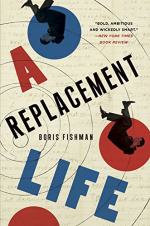|
This section contains 601 words (approx. 2 pages at 400 words per page) |

|
A Replacement Life Summary & Study Guide Description
A Replacement Life Summary & Study Guide includes comprehensive information and analysis to help you understand the book. This study guide contains the following sections:
This detailed literature summary also contains Quotes and a Free Quiz on A Replacement Life by Boris Fishman.
Slava Gelman, a young Russian immigrant, struggles with the technicality of right and wrong in the novel “A Replacement Life” by Boris Fishman. Slava found himself hooked after he wrote a fictitious letter to the Conference on Material Claims Against Germany requesting restitution for his grandfather. When Slava’s letters raise suspicions, he came to the conclusion that there was sometimes no way to be both honest and just.
Slava agreed to write a letter for his grandfather shortly after his grandmother’s death. His grandmother, who had been in the Minsk ghetto during World War II and whose parents were killed in that ghetto, had received a letter informing her she might be eligible for restitution just days before her death. Slava’s grandfather pointed out that she had lived 60 years since her time in the ghetto with no one trying to get her the restitution she deserved. Believing the German government had intentionally delayed the letter, Slava’s grandfather suggested he could get what had been due his wife by pretending that he, also, had been held in the ghetto. Slava at first wouldn’t go along with his grandfather because he didn’t want to lie to the German government and was afraid he’d get in trouble.
Slava changed his mind, however, when he thought he could get to know his grandmother better by trying to write her story, even if it were a false story on his grandfather’s behalf. Slava had once tried to get his grandmother to tell him about her time in the ghetto but had changed the subject when he saw how difficult it was for her. With each of the letters that Slava wrote, he tried to get in touch with his grandmother and understand what she went through.
Although Slava had once distanced himself from Brooklyn where the other immigrants lived he began to feel himself drawn to the people as they told him their stories. He was especially close to one man named Israel Abramson. Israel was very poor and very alone. His wife had died and his son had left America when he joined a sect of Orthodox Jews. He saw more and more how much the Jewish people who had been forced to leave their home country desperately needed help.
When Slava was called to talk to Otto Barber, a man who worked with the Conference on Material Claims against Germany, he had to make a decision about what he would do. Otto suspected that Slava had faked many letters that had been turned into the conference. He told Slava he could either tell him the names of the people who had lied about their circumstances during World War II and save those who actually qualified for the restitution or he could keep quiet and risk keeping all of the people from getting restitution. Slava challenged Otto to do the right thing and pay all of the people. He reasoned at that point that all the Jews had suffered terribly during the time of World War II even if they hadn’t been confined in a ghetto or concentration camp. Otto refused to do so because he didn’t believe it would be morally right. Otto also didn’t see his offer to cover up Slava’s possible transgression as an act of fraud on his part even though Slava pointed out to the man that was what he was offering. In the end, Slava told Otto his own grandfather’s letter was the only one that he knew for sure was fictitious.
Read more from the Study Guide
|
This section contains 601 words (approx. 2 pages at 400 words per page) |

|



